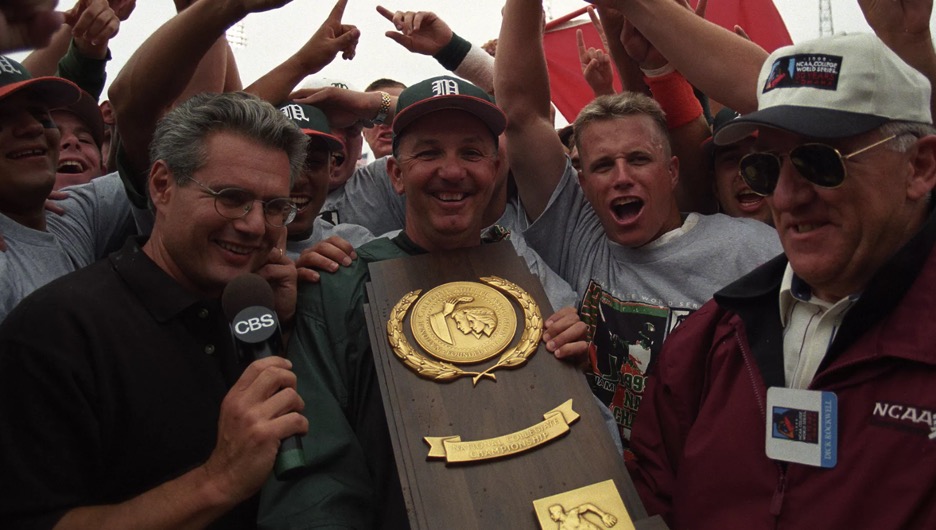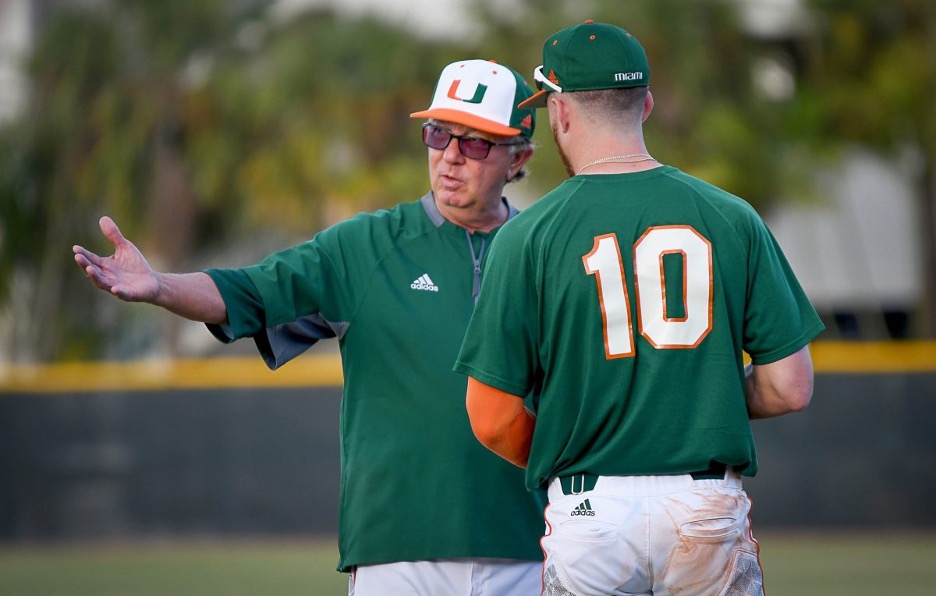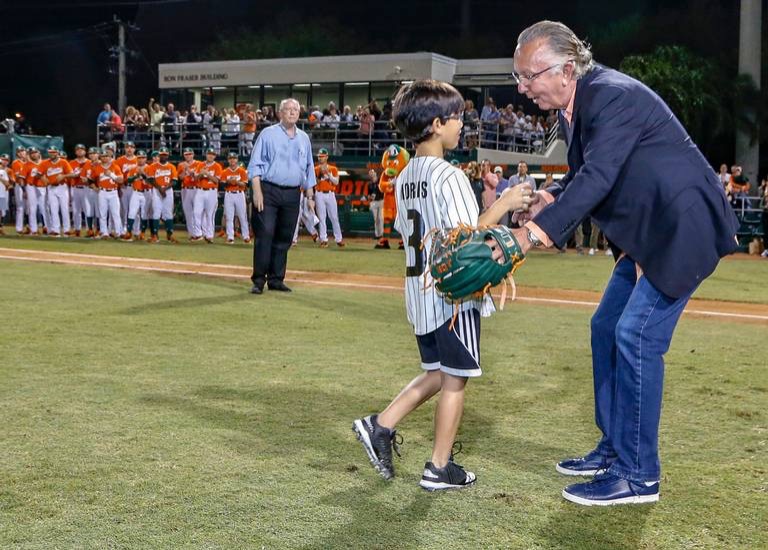

For a quarter century, Jim Morris held the lineup card as the Miami Hurricanes’ skipper. He battled naysayers, opposing coaches, and a volatile housing market. His success on the diamond was revered, guiding the Canes to two national titles, 11 College World Series appearances, and led UM to a then-record 44 consecutive NCAA Tournament appearances. In the crowded college baseball world, Morris helped guide the Hurricanes to the top of the order.
But what the Mark Light Mob didn’t see over Morris’ career in Miami was his perseverance, care, and ability to teach. Each on-field quality translates to a life removed from baseball by far more than 90 feet, but after the final out is made and the teams leave the park, one realizes the longtime coach’s traits are interconnected.
“I don’t have problems making decisions,” Morris told The Miami Hurricane in 2015. That still holds true, five years and a pandemic later.
Every facet of his life is embedded with decisions. Have a one-run lead in the eighth inning with a laboring pitcher on the mound? Time to make a decision. Offered a post-coaching opportunity? Time to make a decision. Love a property at a Sunday open house?
Time to make a decision.
“As a coach I had to make a lot of quick decisions,” Morris says. That ability showed on the biggest stages, but it came from humble roots. “As a young guy, I had to make them by myself. I didn’t have an assistant coach to bounce stuff off of…hopefully as the years go on, you make a lot more right decisions than wrong decisions.”
Even through Zoom, where every conservation seems to take place in 2020, the longtime coach holds a collection that screams Hurricanes baseball. An old, game-worn uniform top occupies the screen’s center, memorabilia commemorating his retired No. 3 is on the left side, and a bobblehead of himself is also in plain sight.
In the coaching business, there are more curveballs than fastballs. That was consistent no matter what dugout Morris found himself in, whether it was the first base line at DeKalb Community College in Georgia—his first coaching job ever—or in the National Title game at Omaha’s Rosenblatt Stadium. But one thing that did stratify each gig, Morris found, were expectations.

Morris arrived at a Miami program laden with extremely high standards. He had transformed Georgia Tech from a lowly doormat into an Atlantic Coast Conference powerhouse, leading the Yellow Jackets to four consecutive league titles from 1985-88. But while winning seasons and conference titles will cement you into a legend at a place like Georgia Tech, Morris was about to learn that the Magic City wouldn’t be so easily satisfied by being just good.
One memory from when UM was trying to sway him to take the vacant coaching job sticks out.
“I came in,” Morris recalls the visit with then-athletic director Paul Dee, “we went into the players’ locker room, the door was propped open to the bathroom, and I looked down at this doorstop that was propping the door open, and it was the national runner-up trophy.” The North Carolina native knew then and there what defined success in Coral Gables.
The bar for expectations and success simply reflects the reality that is baseball at the grassroots level in South Florida.
“It’s a big staple down here,” says Richard Giannotti, a former UM standout and professional prospect who played for the Hurricanes from 2002-04. “You get a big influx of different cultures. You have kind of that Latin flair, that Latin upbringing of love of baseball, and also the American one. So Miami and South Florida is kind of like a melting pot of blended cultures.
“It’s about winning,” Giannotti adds about the local sports scene, even at the junior levels. “We weren’t blue ribbon participants in youth sports. You got a trophy if you won.”
That is bluntly how the local sports landscape works from the bottom up, and Morris had to learn that Canes baseball was the epitome of that cutthroat reality.
It wasn’t easy replacing Ron Frasier, who had come before him as the Hurricane coach. Known as the “Wizard of College Baseball,” Frasier put both UM baseball and the sport of college baseball itself on the national map. He took over the program in 1963 when the team played in an overlooked sandlot in the corner of campus. By the time he retired after the 1992 season, the Canes could claim two national titles, had built the most-attended stadium in the NCAA on private money, and sent off the Wizard into the sunset as an immortal legend.
Morris would eventually break out of Frasier’s shadow by finally winning a championship ring.
Two rings actually, because after beating archrival Florida State in 1999’s nail-biting National Title game, the Hurricanes returned to glory in 2001 for the fourth time in program history.
Morris will always be an illustrious figure in Hurricane baseball history, with his jersey number retired alongside Frasier’s. But while fans recognize the coach as ‘No. 3’ on the field, off the field, he just tries to be Jim Morris.
His identity as a baseball coach and a family man are related. He even proposed to his wife in 2014 at second base of the Hurricanes home ballpark.
Morris and his wife, Nhan, have a son together, an eight-year-old named Will. Morris says it’s ironic that Will has always played and enjoyed all sports except baseball, although he’s ecstatic that his son may finally take up the national pastime in the spring. Still, tennis and nightly flag football practice remain a bigger part of both Morris’ lives for now.
“He is growing up fast, he’s a very good student, he works hard in school, he reads at night, he makes all As,” Morris describes with a chuckle, saying that he was not the same, studious type when he was his son’s age. Still, Will has as much brawn as he does brain, with UM tennis player Bojan Jankulovski calling him, “the most flexible kid” he’s ever seen when working with him at the program’s tennis camp. Morris would be best served to make some room in his trophy case for a father of the year award.
Being a coach or a dad requires passion. Passion defines Morris, regardless of what the task at hand is. Most fans at Mark Light Field would never associate managing runners on base with real estate, but the coach made nearly as much cash flipping homes as he did calling pitches.
He would leisurely go to Sunday open houses for fun, but if he fell in love with a property, Morris would shut down anyone else’s prospective offers on the spot. “You can close on it and move that week,” he adds.
His love of housing stems from a college architecture interest. While a brief stint in the Boston Red Sox minor league organization after his playing days at Elon University eliminated any serious pursuit of infrastructure design, he still carries his more innocent phase with him.
Retirement, family life and the coronavirus had settled Morris down, but at the peak of his coaching career, he went through a home every season or two on average. Still, the skipper couldn’t make it through quarantine without returning to his ace hobby. Critics of baseball may think the game’s pace is slow, but Morris prefers to move fast.
“I’m now living in Vero Beach. We came up here for a visit, and next thing you knew, within two months, our house [in Pinecrest] was sold,” Morris said. While the family has settled into the town he nicknames “Mayberry,” much of his life—from his banking to baseball season tickets—still revolves around Miami. So he leaves a door open for a return to South Florida.

When the coach hung up his cleats for the final time, he dedicated the ensuing calendar year to taking his first deep breath in a perceived eternity. Professional baseball organizations tried to reach out, but Morris knew that wasn’t what he needed to get into. “Don’t make me an offer,” he says he begged, “because I don’t want you to make me an offer I can’t refuse.” Still, one opportunity did jump out at the coach.
So much of coaching is just teaching, after all. Doing something to remain involved in the university was something Morris was seeking, so he began teaching his own course at UM. The transition to the classroom was natural.
The class is titled as a special topics class in sports sciences. Topics including sports financial advice, fundraising, communications, and student-athlete development are taught. Guest speakers from both UM athletics and outside entities are brought in. Giannotti, a financial advisor from Global Wealth Management, was a guest speaker himself for the class last semester.
“My goal is to expose the students to a lot of different areas of the sports industry,” says Morris. Exams are in essay format, not multiple choice, “because I want students to think. The bad news is I have to read all of those papers.”
Morris treats his students just like his players, even in the era of teaching remotely. Tardiness is unacceptable. Cell phones are distractions. And individual improvement is handled through a staple of No. 3’s philosophy in both the classroom and on the diamond.
Say that a player tells Morris: “I want to be a Major League Baseball player.” The coach must ask the player: “What do you have to do to obtain that goal?” The same goes if a student in class wants to be a coach, agent, athletic director, or even something outside of sports. Morris’ assignments help reinforce these goals among the young men and women in his course.
Jankulovski, who took the course in the Spring 2020 semester and wants to stay in the US after graduation, took a lot away from the goal setting assignment. “My main goal, because I’m international, after I graduate, is to find a job that’s going to sponsor my visa,” he says.
“I remember writing that my goal would be finding a company that’s going to sponsor me for that,” added Jankulovski, a senior who aims to work in real estate.
The course earns high marks among students who take it.
“Hearing unique stories about his successes and failures with the Hurricanes’ program reinforced the robust legacy he had built throughout his 25-year tenure,” said junior sports administration major Wyatt Kopelman, who also took the course in Spring 2020. “Whether it was developing young talent for the MLB or ensuring players’ mature approach to both the game and academics as student-athletes, Morris was able to set an example for all in what college baseball should embody.
“Taking a team to the College World Series in 13 of 25 seasons is something that remains quite rare, let alone qualifying for the NCAA Tournament for 44 consecutive years. Learning about the distinct process that went into such milestones further solidified my love and respect for the Canes baseball program, a sport that is at times overshadowed by the school’s storied football team,” said Kopelman.
Morris found the perfect work/life balance over his career, even with a family and a side hustle to add to the stress of college coaching. He is sometimes spotted at games, after giving back to the program by buying season tickets. The presence of his son at games he attends reflects his family-first attitude. Still, Morris tries to stay out of the limelight out of respect for the current coaching reign.
Morris may now live a humble family life. But the accolades he continues to accumulate are anything but. Most recently, he was announced as an inductee to the College Baseball Hall of Fame’s 2020 class.
“There is perhaps no more fitting honor for Coach Morris than to be named a member of the National College Baseball Hall of Fame,” Miami director of athletics Blake James said in an August press release. “Coach [Morris] is college baseball. Over more than five decades in the game, he established a standard of excellence and impacted programs, coaches and players across the nation. While coach Morris is synonymous with the University of Miami for his success on the field, he was so much more than that to our University.”
“I’m very proud that they inducted me and honored to be part of that group,” adds Morris.
Even as one of the most decorated coaches in the sport’s history, he now just aspires to be the best husband and dad he can be. The simple pleasures of family, fun, and the sun now rule once game-filled weekends.
“It’s such a change,” says Morris. “I like the way life is going now for sure, and so does my family.”






